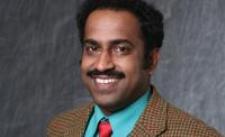Ganpati Ramanath has been named the John Tod Horton ’52 Professor of Materials Engineering at Rensselaer Polytechnic Institute. An endowed professorship is among the highest honors bestowed on a Rensselaer faculty member.
 Ganpati Ramanath
Ganpati Ramanath
“Dr. Ramanath is recognized as a pre-eminent researcher and scholar in the fields of nanostructured materials and interfaces for materials discovery and design for applications in energy, electronics, and heat management. His high-impact and highly visible research helps to bolster the international reputation of Rensselaer as a university where important, world-changing nanotechnology innovations take place,” said Rensselaer Provost Prabhat Hajela. “Dr. Ramanath is also a talented educator and a gifted mentor. The entire campus joins me in congratulating him on his appointment as the Horton Professor.”
The John Tod Horton ’52 Professor of Materials Engineering was established in 1971 by Rensselaer alumnus John Tod Horton, Class of 1952. Horton, who passed away in 2010, had a life-long career with CBI Industries (formerly Chicago Bridge and Iron Company). He was also a member of the Rensselaer Board of Trustees and was awarded the Rensselaer Alumni Association’s Albert Fox Demers Medal in 1982.
Ramanath is a professor in the Department of Materials Science and Engineering at Rensselaer, and a member of the Rensselaer Nanotechnology Center.
Known throughout the global materials science and engineering community as a leader and innovator, Ramanath’s research focuses on nanomaterials and interfaces for applications in electronics and energy. His investigations include the development of new types of materials and thin films through directed synthesis and assembly, as well as the creation of molecularly tailored interfaces with novel or unique properties. Ramanath’s recent discoveries include a new class of thermoelectric nanomaterials built from assemblies of sculpted nanostructures for high-efficiency solid-state refrigeration and electricity harvesting from waste heat, along with nanomolecular layers of “nanoglue” that can join non-sticking materials, inhibit chemical intermixing, and boost thermal transport. His work has been featured internationally by many news organizations, including Thompson Reuters, Scientific American, MSNBC, Discovery Channel, PC World, EETimes, MIT Technology Review, CNET, Science Daily, and others.
A prolific researcher, Ramanath has published 150 refereed articles in top journals, including Nature, Science, Nature Materials, Advanced Materials, and many others. His work has been cited more than 3,800 times and yielded eight patents. Over the past 10 years, he has secured more than $9 million in funding from agencies including the National Science Foundation (NSF), U.S. Department of Energy, U.S. Department of Defense, New York state, Semiconductor Research Corporation, the Office of Naval Research, as well as many companies including IBM, Intel, Novellus, and Honda.
Ramanath is the recipient of an NSF Faculty Early Career Development (CAREER) Award, the Brahm Prakash Visiting Professorship at the Indian Institute of Science, the Bergmann Memorial Young Scientist Award from the United States-Israel Binational Science Foundation, a co-recipient of an IBM Research Partnership Award, and several other honors. He was Alexander von Humboldt Fellow at the Nanoscale Science Department of the Max Planck Institute für Festkörperforschung in Germany, and has been a visiting professor at the International Center for Young Scientists, the National Institute of Materials Science in Japan, the Indian Institute of Science, and the University of Wollogong, Australia. Ramanath is an associate editor of IEEE Transactions on Nanotechnology, and is on the editorial advisory board of the Journal of Experimental Nanoscience and the Open Materials Science Journal.
Earlier this year, Ramanath was announced as a winner of the prestigious Friedrich Wilhelm Bessel Research Award by the Alexander von Humboldt Foundation in Germany.
Ramanath received his doctoral degree in materials science and engineering in 1997 from the University of Illinois at Urbana-Champaign, his master’s degree in materials science and engineering from the University of Cincinnati, and his bachelor’s degree in metallurgical engineering from the Indian Institute of Technology Madras. Prior to joining the Rensselaer faculty as an assistant professor in 1998, Ramanath served as a staff member at Novellus Systems in California and a visiting scientist in the Department of Physics at Linköping University, Sweden. He was promoted to a tenured associate professor in 2003, and full professor in 2006. He served as the director of the Rensselaer Center for Future Energy Systems, a New York State Center for Advanced Technology, from 2008 to 2010.
For more information on Ramanath and his nanomaterials research at Rensselaer, visit:
Source: http://www.rpi.edu/